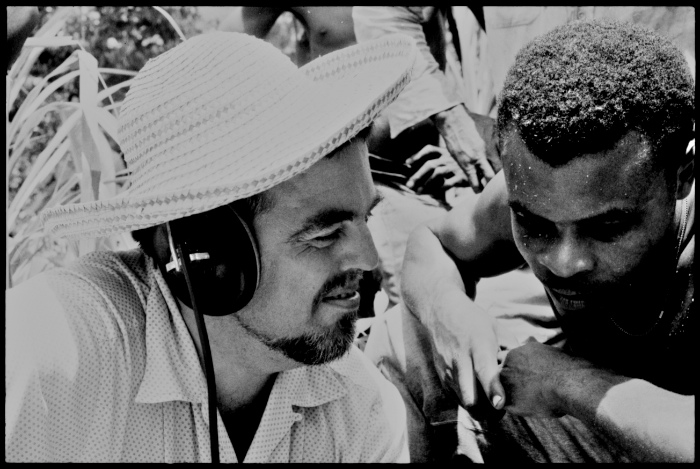
A huge treasure trove of songs and interviews recorded by the legendary folklorist Alan Lomax from the 1940s into the 1990s have been digitized and made available online for free listening. The Association for Cultural Equity, a nonprofit organization founded by Lomax in the 1980s, has posted some 17,000 recordings.
“For the first time,” Cultural Equity Executive Director Don Fleming told NPR’s Joel Rose, “everything that we’ve digitized of Alan’s field recording trips are online, on our Web site. It’s every take, all the way through. False takes, interviews, music.”
It’s an amazing resource. For a quick taste, here are a few examples from one of the best-known areas of Lomax’s research, his recordings of traditional African American culture:
- “John Henry” sung by prisoners at the Mississippi State Penitentiary, Parchman Farm, in 1947.
- “Come Up Horsey,” a children’s lullaby sung in 1948 by Vera Hall, whose mother was a slave.
- “In a Shanty in Old Shanty Town” performed by Big Bill Broonzy, 1952.
- “Story of a slave who asked the devil to take his master,” told by Bessie Jones in 1961.
But that’s just scratching the surface of what’s inside the enormous archive. Lomax’s work extended far beyond the Deep South, into other areas and cultures of America, the Caribbean, Europe and Asia. “He believed that all cultures should be looked at on an even playing field,” his daughter Anna Lomax Wood told NPR. “Not that they’re all alike. But they should be given the same dignity, or they had the same dignity and worth as any other.”
You can listen to Rose’s piece about the archive on the NPR website, as well as a 1990 interview with Lomax by Terry Gross of Fresh Air, which includes sample recordings from Woody Guthrie, Jelly Roll Morton, Lead Belly and Mississippi Fred McDowell. To dive into the Lomax audio archive, you can search the vast collection by artist, date, genre, country and other categories.
Note: An earlier version of this post originally appeared on our site in March 2012.
If you would like to sign up for Open Culture’s free email newsletter, please find it here. Or follow our posts on Threads, Facebook, BlueSky or Mastodon.
If you would like to support the mission of Open Culture, consider making a donation to our site. It’s hard to rely 100% on ads, and your contributions will help us continue providing the best free cultural and educational materials to learners everywhere. You can contribute through PayPal, Patreon, and Venmo (@openculture). Thanks!
Related Content:


I fell in love with his collections back in the mid 60s and can’t tell you how excited I am!
OMGoodness!!! Looks like I’m going to be too busy to be reached for a loooooong while!!!
Hooray.
Folklorist Alan Lomax is as much a treasure as the folk artist he helped to give audience to. 🎼
This is a wonderful resource for all music educators!!! Thank you so Very much❤️🎶❤️🎶❤️😁❤️
Always enjoyable to step back into the past, and share time with 19th and 20th century musicians.
This is very amazing. I’m from Brasil but I’m a blues’slave. I have 3 journeys along ALL away the Mississipi Valey. From S to N. Thanks a lot.
Alan Lomax is a true hero!
I salute the ethnomusicologist who celebrates & preserves for all the musical history of yesteryear. The Lomax recordings are an inspiration to fine folks like Chris S. at Arhoolie & Down Home Music & built the foundation for shops like mine, Open Mind Music. I raise my glass, tip my cap & spin my record in his honor.
My Grandpa was a musician in the 40’s and 50’s in Amarillo, Tx and I have some photo’s of him in a band called the Lomax Band. I haven’t been able to find any information on this band back then. My mother did tell me it was a jazz kind of swing band and that was all she knew and could remember. Anybody out there know anything this and is it the same bunch of Lomax’s?
In 1950 we went to Wsshington DC and listened to some of Lomax’s recordings at the Library of Congress.